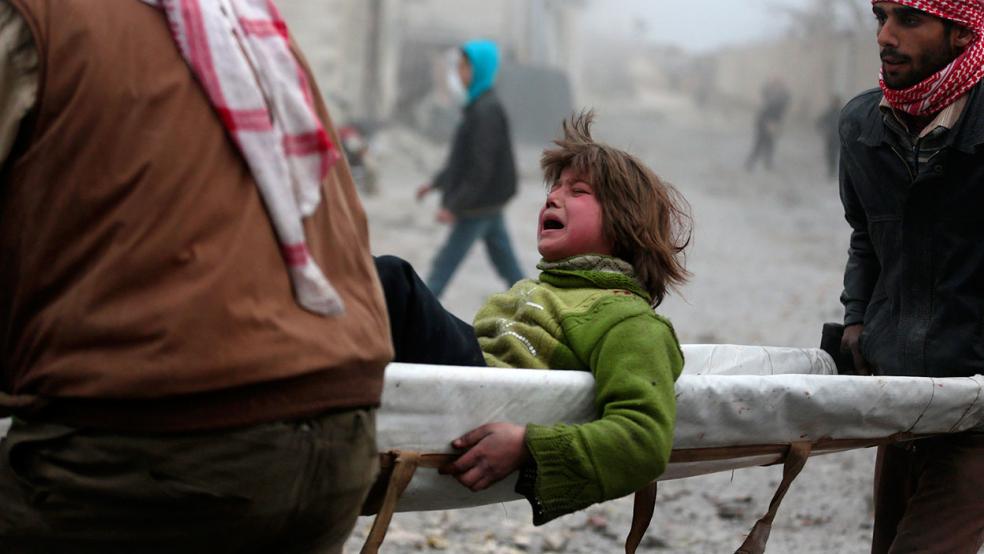OP-ED
Barrel bombs are the new normal. These crude weapons are filled with TNT and dropped from Syrian government aircraft. On December 28th, they obliterated part of a market in Aleppo and killed at least 25 people, including children.
Their crudeness is useful—a more sophisticated weapon might blur the disastrous disconnect between Obama’s post-power fantasy of a foreign policy and the realpolitik knife-fight reality of the Syrian war. Already, this conflict has killed roughly as many people as did the Bosnian genocide, and there’s no relief in sight. Once Assad wins the war, the killing will only continue.
Related: Obama at War with His Own Argument over Syria
It’s difficult to talk about the Syrian government without paraphrasing dialogue from the movie Braveheart. But at the risk of plagiarism: the Assad regime is the most ruthless Arab state in the Middle East, second only to Saddam Hussein’s late Iraq. It is the mortal enemy of its own Sunni majority, which haunted the regime with violence until it was crushed utterly in 1982.
That year, Syrian Sunnis hung out their shingle in Hama, Syria’s fourth-largest city. After Muslim Brotherhood-linked militants ambushed and annihilated a company of Syrian soldiers, the elder Assad brought in a division-sized element of Syrian security forces and, after several days of urban fighting involving tanks and heavy artillery, razed sections of Hama down to the ground with bulldozers. Amnesty International estimates that 10,000-25,000 people were killed, most of them civilians. Many of them by executioners, after the fighting had stopped.
That is power, for Assad. For Obama, power is conferences; it is popularity; it is negotiations and talks, meeting stakeholder representatives (in the loosest, least-Jeffersonian sense) and discussing their diametrically opposed interests until one kills the other. Because for the representatives, power is men with guns who are willing to murder. In Libya, in Afghanistan, in Iran, in Egypt, and most of all in Syria, US mediators with their panel discussions and their seating charts don’t even stand a chance.
“Stalemate” has been Obama’s watchword in the Syrian conflict, ever since the Administration backed down from enforcing its red line over chemical weapons in September. The idea is that two deadly enemies of the United States, Greater Iran and Al-Qaeda, will so bleed themselves in Syria that they’ll be too exhausted to harass the United States elsewhere. Conveniently also, Obama will not have to do anything unpopular.
Related: Obama’s Gambit on Syria Belies a Clear Mideast Policy
It sounds interesting. It’s a micro-variant of the offshore balancing strategy beloved by realists, wherein the US prevents any state – Arabs, Israelis, or Iranians – from achieving regional supremacy. It’s also a complete fantasy. The Middle East abhors a vacuum, and absent superpower backing or helpful terrain, no breakaway enclave will survive. It took active US support, including continuous air combat missions, to preserve the autonomy of Iraq’s Kurds. The Syrian rebels, without helpful mountains and less-helpful Americans, will not be so lucky.
The tides are also beginning to flow against them. The government has been making a series of small but steady gains, cutting off key insurgent positions in Damascus, in the west, and pressuring Aleppo. Hezbollah light infantry, removed from Lebanon with its mantra of “resistance” exposed as myth, is being used freely and effectively. The Hezbollahis are better than the Sunni rebels, as they would be, since they’ve been fighting sporadically for decades. They’re better armed and trained also, courtesy of the Iran’s Revolutionary Guard.
There was a chance for the United States to help the non-Islamist rebels under the Free Syrian Army banner overthrow Assad, who leads the most hostile and revisionist Arab regime in the Middle East and is a stalwart ally of Iran. The Administration hesitated, even to the point of sending ammunition to the rebels. Ammunition! When the Middle East is like an arms bazaar with kabobs
So the traditional champions of Sunnism stepped in, those wealthy non- and semi-governmental Gulf Arabs whose money and weapons flowed not to the rebels we would have picked, but to the usual suspects: the Islamists; the radicals; and the crazies.
In future years, Americans will probably be subjected to the rites of Rwanda performed over the Syrian tragedy. Former Administration officials will speak regretfully of the casualties at international ceremonies and panels, the case held up as a moral cudgel with which to batter the developed world. The remembrance ceremonies will probably be moving, and the discussions thought-provoking.
But let us remember this: the Administration’s hesitation caused the Syrian people, in their desperation, to turn to forces they did not totally support but who could fight. And now that the opposition is dominated by these forces, which Assad claimed were behind the violence in the first place, the Administration can point and says you see? Nothing we can do. It’s al-Qaeda in Syria. But it wasn’t always; and that won’t help the dead-to-be.
Andrew L. Peek was a personal strategic advisor to the top U.S. and NATO commander in Afghanistan. You can follow him on Twitter at @AndrewLPeek.
Top Reads from The Fiscal Times:





